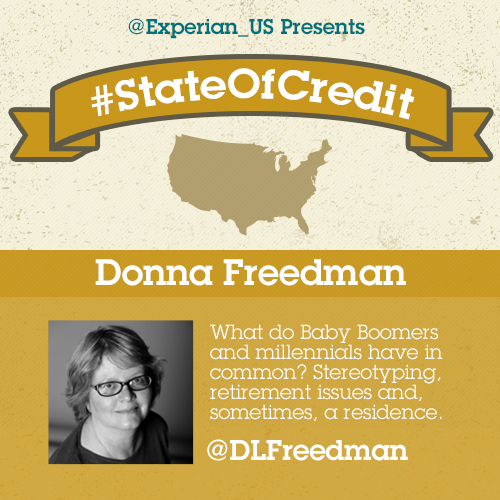
This guest post is from Donna Freedman (@DLFreedman). Donna is a former newspaper journalist and staff writer for MSN Money and Get Rich Slowly. Currently she writes for Money Talks News and for her own website, donnafreedman.com.
What do Baby Boomers and millennials have in common? Stereotyping, retirement issues and, sometimes, a residence.
About that last: According to a Pew Research Center study called “The Boomerang Generation,” 29% of adults aged 20 to 34 live with their folks. Which leads us to a two-pronged stereotype: Boomers were overly indulgent parents who never let their kids suffer even a moment of The Sadz, which is why millennials are such an entitled, failure-to-launch cadre.
Maybe that’s true in some cases. Definitely not all. Technically I’m a Boomer (December 1957) but neither I nor anyone I know lived as an aimless, self-centered, smash-the-state brat – and ask my daughter whether I made her write thank-you notes and go to bed on time.
As for those much-maligned millennials: Plenty would love to have decent jobs and places of their own, thankyouverymuch. Don’t blame them if sometimes the only available gigs are part-time and poorly paid. According to the Experian State of Credit report, their average debt load is $23,332 – and not necessarily as a result of riotous living, since that amount includes student loans. In fact, millennials have the fewest bank cards of the four generations studied – but they are developing some disturbing habits, such as late payments and overutilization of credit.
Are they buying daily lattes and semi-annual tech upgrades with those cards? Hard to say. They could also be using them for things like groceries and utility payments, if they’re servicing student loans with less-than-ideal salaries.
Which brings us to another Pew study: Some 27% of people in their 40s and 50s are providing primary support to a grown child, and more than one in five have provided some financial help to a parent in the past year. Maybe that’s one of the reasons this generation has the highest number of bankcards and carries the highest balances of the four generations studied. They’re managing it well (i.e., they have good credit scores) but that could change if, say, their job situations did.
More to the point: If these sandwiched Boomers are carrying consumer debt and helping their kids and/or their parents, how much can they set aside for their own golden years? Especially since recent data from Interest.com indicate that seniors in 48 states run the risk of outliving their money.
Not that the young folks are sitting in butter: If 29% of millennials can’t afford to make it on their own (hello, student loans!) what’s the likelihood that they’re saving for retirement now, when compound interest is on their side?
The bad news, for both groups: Retirement is inexorable, whether it’s four years or four decades away.
The good news: It’s not too late to catch up, or to get started – but it probably won’t be easy.
Making conscious choices
The trick is not to think of it as sacrifice or deprivation, but rather as living intentionally. That means finding new ways to meet today’s expenses without letting them overshadow future wants and needs.
A tight budget does not necessarily preclude a meaningful life. Entire books and countless blogs are written on the subject of living frugally and creatively. (Everyone does this differently, by the way. You don’t have to dumpster-dive or make your own laundry soap unless you want to.)
Start with a free budgeting tool such as Mint.com or PowerWallet. You might be shocked to find out how much of your paycheck is dribbling away on things that don’t really matter. Once you know where your money is – and isn’t – going, you can start redirecting it to where it will do the most good.
These sites help you define goals and figure out new ways to reach them. Hint:
Celebrate every victory, even if it’s just “I set aside another $20 for my Roth IRA.” That double sawbuck might not feel like much, but you are making progress. You are taking control of your finances by making smart, conscious choices about spending.
No more second-guessing
What you shouldn’t be spending? Another moment’s energy moaning about the past, e.g., “Why didn’t I make retirement a priority?” or “Why didn’t I choose a cheaper university?” News flash: The past is past and can’t be retrofitted with smarter behavior.
We’re human. Sometimes we make the wrong choices. Sometimes we have “choices” thrust upon us: inflation, layoffs, illness, lack of jobs in our fields. Again: Focus on the progress you’re making vs. what went wrong in the past.
For far too long I obsessed over what I considered my “lost” years, a time marked by depression, little to no financial planning, a protracted divorce that left me in my late 40s with zero savings. Frugality and creativity got me through and I came out on the other side with a university degree, rebuilt savings, a Roth IRA and – most important of all – the determination to live intentionally.
Am I all set up for a cushy retirement? Not yet. But I’m working on it, and also working to live as intriguing a life as possible even though I don’t have a 9-to-5 paycheck. No more looking back to second-guess past mistakes. Instead, I decided that I don’t want to lose any more time focusing on the time I’ve lost. Here’s hoping you won’t, either.
